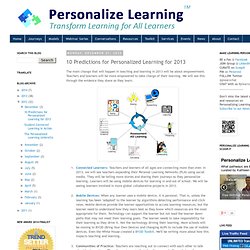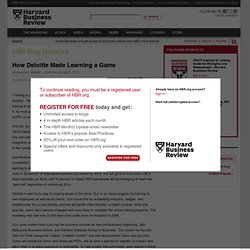

Lessons Worth Sharing. Ensayos de Calidad, Tareas, Monografias, y Trabajos de Investigación Personalizados - BuenasTareas.com. 30 Surprising (And Controversial) Ways Students Learn. Have you checked your assumptions about student learning at the door? People in general, hold onto beliefs that are shaped by early experiences, the media, and faulty influences. The following list is a compilation of research that may surprise you. Video games, e-books, playtime, and music are all a part of an educator’s repertoire.
Read on, and be prepared to put your traditional beliefs aside as science points to innovative methods that indicate future success. 1. Until recently, studies done with regards to children and video games usually centered on the negative impacts and consequences of prolonged use. She recognized several social motivations for playing video games including competition, a reason to hang out and casually converse with friends, and teaching peers how to play a game. In boys who struggle with stress, fear, and anger- negative emotions that can have violent consequences- video games acted as a safe alternative for the release of pent up emotion. 2. 3. 4. Patrick S. Neuroeducación: estrategias basadas en el funcionamiento del cerebro « Escuela con cerebro. La información que tenemos sobre el cerebro humano, órgano responsable del aprendizaje, se ha visto claramente incrementada debido al desarrollo de las nuevas técnicas de visualización cerebral.

Como consecuencia de estas investigaciones recientes, aparece una nueva disciplina en la que confluyen los conocimientos generados por la neurociencia, la educación y la psicología que nos pueden aportar información significativa sobre el proceso de enseñanza y aprendizaje. La neuroeducación consiste en aprovechar los conocimientos sobre el funcionamiento cerebral para enseñar y aprender mejor. Educational Psychology. CAST: Center for Applied Special Technology. 10 Predictions for Personalized Learning for 2013.
The main change that will happen in teaching and learning in 2013 will be about empowerment.

Teachers and learners will be more empowered to take charge of their learning. We will see this through the evidence they share as they learn. Connected Learners: Teachers and learners of all ages are connecting more than ever. In 2013, we will see teachers expanding their Personal Learning Networks (PLN) using social media. They will be telling more stories and sharing their journeys as they personalize learning. Evidence of Learning: Assessment will look different in 2013. PLE, conectivismo y el aprendizaje informal. ¿Cómo hemos llegado hasta aquí?

El conocimiento siempre ha existido fuera del aula, pero hoy con las nuevas tecnologías, internet, la web 2.0 y las redes sociales esto se hace más evidente. Hemos pasado de una forma solida del conocimiento caracterizada por el saber contenido en los libros, las aulas, los docentes, a una líquida en la cual el aprendiz puede moldear según el contexto y las circunstancias a las que se enfrenta dicho conocimiento, el cual ahora tenemos en forma de audio, videos, textos digitales, entre otros. El impacto de las TIC (Tecnologías de la Información y la Comunicación) en nuestro entorno social es innegable, como innegable es el aumento de la socialización que estas permiten y en particular las redes sociales que generan el intercambio de ideas que aceleran de manera considerable el desarrollo de todas las áreas del conocimiento.
How Deloitte Made Learning a Game - Jeanne C. Meister. By Jeanne C.

Meister | 8:00 AM January 2, 2013 “Training is a funny thing,” James Sanders, Manager of Innovation at Deloitte Consulting, told me recently. “No matter how easy you make it to access, or how brilliant the learning programs are, training is simply not the first thing people think of doing when they have some free time. Knowmads. Self-regulated learning. Self-regulated learning (SRL) is learning that is guided by metacognition (thinking about one's thinking), strategic action (planning, monitoring, and evaluating personal progress against a standard), and motivation to learn.[1][full citation needed] "Self-regulated" describes a process of taking control of and evaluating one's own learning and behavior.[2] Self-regulated learning emphasizes autonomy and control by the individual who monitors, directs, and regulates actions toward goals of information acquisition, expanding expertise, and self-improvement” (Paris and Paris 2001).
In particular, self-regulated learners are cognizant of their academic strengths and weaknesses, and they have a repertoire of strategies they appropriately apply to tackle the day-to-day challenges of academic tasks. Self regulated learners are successful because they control their learning environment. Ethiopian Children Handed Free Tablet Computers to Teach Themselves. The path to Wenchi leads along the rim of an extinct volcano.

It winds through banana plantations and brier patches, with wild marjoram growing rampant along the edge. There is a crater lake below, and beyond it lies the Great Rift Valley, also known as the cradle of humanity. The ancestors of Homo sapiens lived in the valley a million years ago. Knowmad Society - About. Why (And How) You Should Create A Personal Learning Network. What Is A PLN? Through the use of my own Personal Learning Network (PLN) , I came across several great examples that both define what a PLN is, and explain the value of creating one for yourself. According to a wikispace about creating PLNs, “Personal Learning Networks are systems that help learners take control of and manage their own learning. This includes providing support for learners to: The Future of Learning, Networked Society - Ericsson.